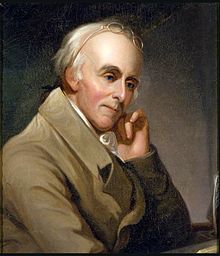
Back بنجامين راش Arabic بنجامين راش ARZ بنجامین روش AZB Бенджамін Раш Byelorussian Бенджамин Ръш Bulgarian Benjamin Rush Czech Benjamin Rush German Benjamin Rush Spanish بنیامین راش Persian Benjamin Rush Finnish
Benjamin Rush | |
|---|---|
 A c. 1818 portrait of Rush by Charles Willson Peale | |
| Delegate to the Second Continental Congress from Pennsylvania | |
| In office 1776–1777 | |
| Personal details | |
| Born | January 4, 1746 Byberry, Province of Pennsylvania, British America |
| Died | April 19, 1813 (aged 67) Philadelphia, Pennsylvania, U.S. |
| Resting place | Christ Church Burial Ground, Philadelphia |
| Children | 13, including Richard and James |
| Alma mater | Princeton University University of Edinburgh |
| Occupation | Physician, writer, educator |
| Known for | Signer of the United States Declaration of Independence |
| Signature | |
Dr. Benjamin Rush (January 4, 1746 [O.S. December 24, 1745] – April 19, 1813) was an American revolutionary, a Founding Father of the United States and signatory to the U.S. Declaration of Independence, and a civic leader in Philadelphia, where he was a physician, politician, social reformer, humanitarian, educator, and the founder of Dickinson College. Rush was a Pennsylvania delegate to the Continental Congress.[1] He later described his efforts in support of the American Revolution, saying: "He aimed well."[2][3] He served as surgeon general of the Continental Army and became a professor of chemistry, medical theory, and clinical practice at the University of Pennsylvania.[4]
Dr. Benjamin Rush was a leader of the American Enlightenment and an enthusiastic supporter of the American Revolution. He was a leader in Pennsylvania's ratification of the U.S. Constitution in 1788. He was prominent in many reforms, especially in the areas of medicine and education. He opposed slavery, advocated free public schools, and sought improved, but patriarchal,[5] education for women, and a more enlightened penal system. As a leading physician, Rush had a major impact on the emerging medical profession.
As an Enlightenment intellectual, Rush was committed to organizing all medical knowledge around explanatory theories, rather than relying on empirical methods. Rush argued that illness was the result of imbalances in the body's physical system and was caused by malfunctions in the brain. His approach prepared the way for later medical research, but Rush undertook none of it. He promoted public health by advocating clean environment and stressing the importance of personal and military hygiene. His study of mental disorder made him one of the founders of American psychiatry.[6] In 1965, the American Psychiatric Association recognized Rush as the "father of American psychiatry".[7]
- ^ Cite error: The named reference
signerswas invoked but never defined (see the help page). - ^ Renker, Elizabeth M. (1989). "'Declaration-Men' and the Rhetoric of Self-Presentation". Early American Literature. 24 (2): 123 and n. 10 there. JSTOR 25056766.
- ^ Rush, Benjamin (1970) [1948]. George Washington Corner (ed.). The autobiography of Benjamin Rush; his Travels through life together with his Commonplace book for 1789–1813. Westport, CT: Greenwood Press.
- ^ "Benjamin Rush (1746–1813)". University of Pennsylvania. Archived from the original on June 10, 2011. Retrieved August 20, 2011.
- ^ Fraser, James (2019). The school in the United States: a documentary history (Fourth ed.). New York, NY: Routledge. p. 25. ISBN 978-1-138-47887-9.
- ^ Muccigrosso, Robert, ed. (1988). Research Guide to American Historical Biography. Vol. 4. pp. 1139–42.
- ^ Shorter, Edward (1997). A History of Psychiatry: From the Era of the Asylum to the Age of Prozac. Wiley.